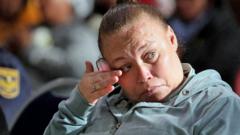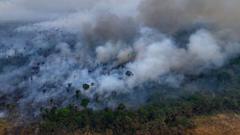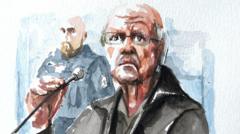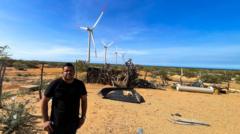The Mariana dam collapse in Brazil remains a haunting tragedy that resulted in the loss of 19 lives, including that of Gelvana Rodrigues's seven-year-old son, Thiago. As legal battles unfold in the UK against BHP, survivors express their heartache and desire for justice, while the companies involved attempt to manage the aftermath and compensate victims.
Brazil Dam Collapse Trial: Survivors Seek Justice as Legal Proceedings Begin

Brazil Dam Collapse Trial: Survivors Seek Justice as Legal Proceedings Begin
Survivors of the 2015 Mariana dam disaster in Brazil are taking legal action against BHP in the UK, seeking compensation for the lives destroyed.
The emotional impact of the 2015 Mariana dam disaster continues to resonate strongly with survivors as a major trial against BHP begins in London. Many victims lost loved ones, homes, and their way of life when toxic mud engulfed their communities after the dam burst. Gelvana Rodrigues, who lost her son Thiago in the disaster, reflects on her immense pain, stating, “Nothing can bring a life back.”
This disaster, marked as Brazil's worst environmental crisis, took place on November 5, 2015, when the dam, owned by a joint venture of mining firms Vale and BHP, failed catastrophically. Roughly 620,000 people are involved in the UK lawsuit against BHP, which is accused of operational control that contributed to the disaster. The trial, initiated due to claims that the UK headquarters of BHP were relevant to the case, will determine the company's liability and possibly lead to a second phase for damages.
Marcos Muniz, a long-time resident of one of the impacted towns, recalls the feeling of disbelief when faced with the devastation of his home and community. He, like many others, grapples with the transition to a new town called Novo Bento, built to compensate victims and separate from the original ghost town that remains submerged under sludge.
While the Renova Foundation, established by BHP and Vale, has sought to mitigate the damages by distributing compensation and housing to 445,000 people affected, the core issues of liability and emotional trauma persist. Some survivors, including Darliza das Graças, have found new beginnings, but the sense of community and familiarity is irreplaceable.
Both BHP and Vale maintain they are addressing the situation and deny liability for the disaster, with ongoing negotiations for additional compensation reaching over $45 billion expected to commence. The UK case, which began in 2018, seeks what the claimants’ lawyers describe as “fair and full compensation” for the profound losses endured, predicted to potentially amount to $44 billion.
As the trial progresses, survivors like Gelvana hope for justice—not necessarily monetary, but a sense of accountability that will prevent such tragedies from repeating.
This disaster, marked as Brazil's worst environmental crisis, took place on November 5, 2015, when the dam, owned by a joint venture of mining firms Vale and BHP, failed catastrophically. Roughly 620,000 people are involved in the UK lawsuit against BHP, which is accused of operational control that contributed to the disaster. The trial, initiated due to claims that the UK headquarters of BHP were relevant to the case, will determine the company's liability and possibly lead to a second phase for damages.
Marcos Muniz, a long-time resident of one of the impacted towns, recalls the feeling of disbelief when faced with the devastation of his home and community. He, like many others, grapples with the transition to a new town called Novo Bento, built to compensate victims and separate from the original ghost town that remains submerged under sludge.
While the Renova Foundation, established by BHP and Vale, has sought to mitigate the damages by distributing compensation and housing to 445,000 people affected, the core issues of liability and emotional trauma persist. Some survivors, including Darliza das Graças, have found new beginnings, but the sense of community and familiarity is irreplaceable.
Both BHP and Vale maintain they are addressing the situation and deny liability for the disaster, with ongoing negotiations for additional compensation reaching over $45 billion expected to commence. The UK case, which began in 2018, seeks what the claimants’ lawyers describe as “fair and full compensation” for the profound losses endured, predicted to potentially amount to $44 billion.
As the trial progresses, survivors like Gelvana hope for justice—not necessarily monetary, but a sense of accountability that will prevent such tragedies from repeating.




















